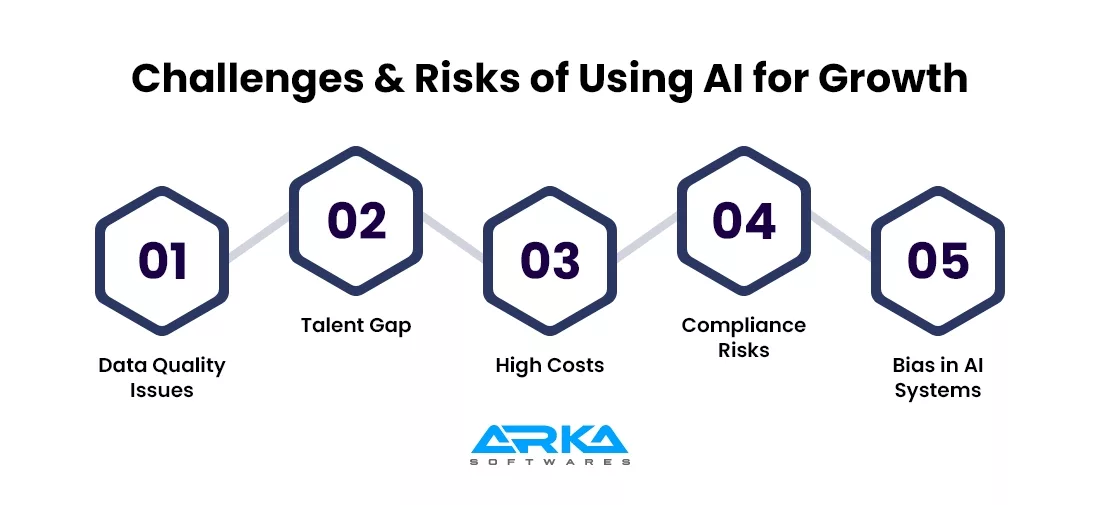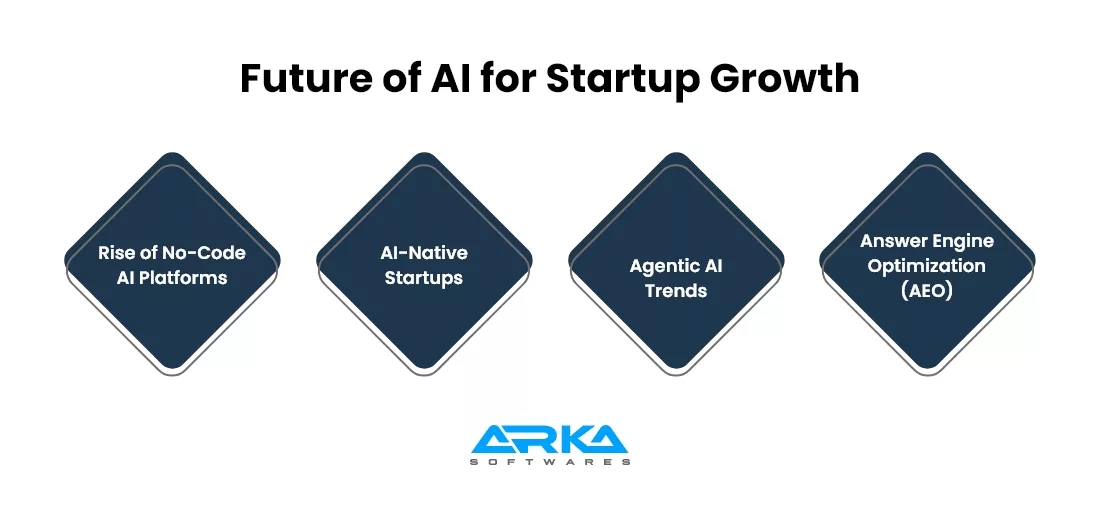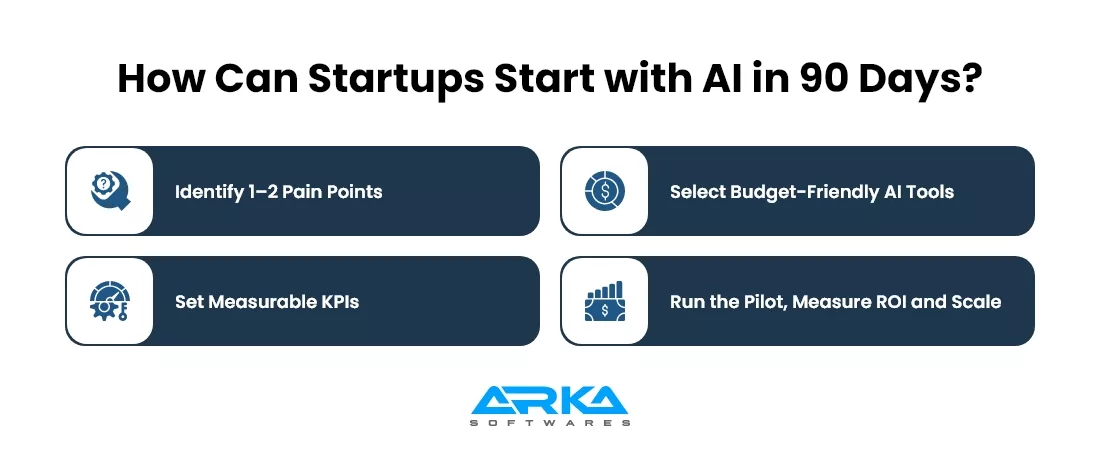Startups grow fast when they make smart choices early. Some scale three times quicker because they use advanced tools. AI for Growth is one of those tools. It helps young companies save money, improve products and serve customers better.
The AI market is not small. It is projected to reach 244 billion USD in 2025, up from 186 billion USD in 2024. That is a growth of nearly 35 percent in one year. This sharp rise shows that AI is no longer optional. Startups that use it gain an edge over others who wait.
This blog explains how startups can use AI for growth in six areas. These include market research, marketing and sales, product development, customer support, operations and finance. Each section shares practical use cases, facts and examples.
AI for Growth is the use of artificial intelligence to speed up business growth. It gives startups the power to make quick decisions, use data effectively and scale without heavy resources.
AI for startups works as a growth partner. It allows teams to track customer behavior, test new ideas and adjust strategies in real time. This agility helps young companies compete with larger rivals.
The AI industry itself proves its value. It is projected to reach 244 billion USD in 2025. This number shows that AI is no longer a future trend. It is a present-day driver of growth for businesses of every size.
Startups that apply AI gain:
In practice, AI for Growth helps startups operate smarter, move faster and build a strong foundation for long-term success.
AI market analysis gives startups a clear view of customer needs and market trends. It replaces guesswork with real insights, helping founders focus on strategies that drive growth.
By applying predictive analytics for startups, teams can forecast demand, track customer behavior and find churn risks early. This allows faster actions and prevents revenue loss.
AI for customer understanding makes segmentation simple. Startups can divide customers into groups based on data, not assumptions. This ensures marketing, product and sales efforts match real demand.
The scale of investment highlights its value. Global corporate spending on AI reached 91.9 billion USD. This shows how much companies trust AI to fuel data-driven growth.
Data-driven growth with AI gives startups three advantages:
Startups that use AI in research and insights grow with clarity. They know their customers, act on patterns and stay ahead of competitors.
Startups can grow faster when they use AI marketing tools for growth. These tools help teams target the right people, reduce costs and improve campaign results.
With AI in sales automation, routine tasks like lead scoring and follow-ups become faster. Founders and sales teams can focus on closing deals instead of wasting time on manual work.
AI-powered lead generation gives startups an edge. By tracking customer actions, AI identifies high-quality prospects. This means teams can reach the right leads at the right time with less effort.
Artificial intelligence in digital marketing improves ad targeting by sending campaigns to the right audience at the right time with the right message. This reduces wasted spend and increases conversions.
The numbers confirm the shift. The AI market grew by 34.7 percent in 2024, with the largest adoption in marketing and sales functions. Startups that use these tools gain faster returns and stronger revenue growth.
For example, startups applying AI tools for startup marketing automation cut wasted ad spend by up to 30 percent. This saving allows them to reinvest in new campaigns and scale customer reach.
![Need Guidance on AI for Growth? Talk to our experts and explore how AI can fit into your startup journey. Get clear answers and a tailored approach. Button: [Book a Free Consultation]](https://live-arkasoftwares.s3.amazonaws.com/uploads/2025/10/06123607/CTA-1-jpg.webp)
AI innovation for startups helps teams build products that match customer needs faster. Startups can use AI to test ideas, improve features and reach product-market fit without wasting resources.
With AI-powered product growth, startups run A/B testing to see what works best for users. AI studies feedback and usage data in real time, showing which features drive engagement.
Artificial intelligence for product design speeds up prototyping. It suggests new designs, simulates results and highlights flaws before launch. This saves money and shortens development cycles.
The potential is huge. By 2025, the machine learning market will reach 113 billion USD and the NLP market will hit 48 billion USD. These technologies are the foundation of smarter product growth for startups.
Startups applying machine learning-driven innovation can predict customer behavior and create features that improve retention. For example, a mobile app startup increased feature adoption by 40 percent using AI-driven design insights.
AI for product development startups also benefits from generative AI for startups. It creates new design options, builds content and automates testing. This helps small teams deliver innovation at the speed of larger companies.
Startups that adopt AI in product development move faster, cut costs and deliver solutions that customers want.
AI chatbots for growth give startups the ability to support customers at any time. They answer questions, guide users and handle simple issues without delay.
AI-powered customer support reduces pressure on human teams. Virtual assistants take care of routine requests, while agents focus on complex cases. This balance improves speed and quality.
Artificial intelligence in user experience enables personalization. AI studies customer behavior and delivers content, offers or reminders that match each user. This makes interactions more relevant and effective.
AI-driven customer retention strategies help prevent churn. Startups can see which users are likely to leave and act early to keep them engaged. This protects revenue and strengthens loyalty.
The market proves its importance. The generative AI industry will reach 63 billion USD in 2025 and customer experience will remain one of the largest use cases.
For example, a fintech startup cut customer wait times by 50 percent using AI chatbots. Customers received quick help, while the support team managed higher-value tasks.
AI business efficiency helps startups reduce costs and use resources wisely. It turns repetitive tasks into automated processes, so teams can focus on important work.
AI automation for startups improves HR, finance and supply chains. In HR, AI screens resumes and manages onboarding. In finance, it monitors transactions and detects fraud. In supply chains, it predicts demand and prevents stock issues.
AI-driven productivity growth means startups do more with smaller teams. Automation reduces errors, speeds up tasks and supports quick decisions. This creates a lean and efficient business model.
The market proves its value. The AI robotics sector is projected to reach 23 billion USD in 2025. This growth shows how automation is scaling across industries, from digital workflows to physical operations.
Artificial intelligence for cost saving delivers measurable returns. For example, an AI chatbot pilot can save startups thousands of dollars in the first year by cutting support costs.
When applied well, AI cost for startups 2025 becomes an investment, not a burden. It supports efficiency, lowers risks and creates a clear path to sustainable growth.
Strong financial planning decides if a startup scales or struggles. AI financial growth tools give founders the clarity to manage budgets, forecast trends and avoid waste.
With AI-powered decision making, startups use real-time data to guide spending. Instead of relying on guesswork, leaders see cash flow patterns and can act before risks grow.
Artificial intelligence in forecasting improves accuracy. AI models review past performance, market conditions and customer behavior to predict revenue and costs. This helps startups set realistic goals and plan for growth.
By 2025, corporate investment in AI is projected to cross 91.9 billion USD, with financial analytics as a key use case. This shows how important forecasting has become in startup strategy.
For example, startups applying predictive analytics for startups reduce cash flow errors and prevent misallocations. One SaaS company used AI-driven forecasting to identify churn risks early, improving retention and stabilizing revenue.
Startups worldwide show how AI drives measurable growth. Here are three AI success stories for growth that prove its impact:
Built an AI platform that studies customer behavior.
Delivered personalized recommendations and offers.
Helped clients increase conversions by 19 percent.
These startup AI case studies are strong AI-driven scaling examples. They show that growth through artificial intelligence is not theory but proven practice.

Startups face several challenges in adopting AI that can slow down their progress. The main risks in AI-driven growth include technical, financial, and ethical barriers.
AI depends on clean and accurate data. Poor or incomplete datasets lead to weak predictions. This is one of the most common AI integration issues for startups.
Finding skilled AI engineers and data scientists is expensive. Many startups lack the in-house expertise to manage tools, which creates delays and missteps.
AI requires investment in cloud resources, tools and training. Without clear ROI, these expenses become artificial intelligence limitations in growth for early-stage companies.
Startups must follow privacy rules like GDPR and CCPA. Failure to comply leads to fines and loss of trust.
AI models trained on flawed data can create unfair outcomes. This risk hurts user trust and investor confidence.
By planning carefully, startups can overcome these AI adoption challenges and reduce long-term risks.
The future of AI in startups is moving fast. New tools and models will define how young companies scale and compete. Generative AI already grew by 85 percent in 2024, making it the fastest-growing segment.
Startups that prepare for these AI growth trends will have a clear advantage.
No-code tools let founders build solutions without heavy coding. These platforms lower costs and speed up adoption. For startups, this emerging AI technology for growth makes it possible to test ideas and scale faster.
AI-native startups build their core products directly on AI models. This approach reduces the need for large teams and allows faster scaling. It reflects the broader AI evolution for business scaling where efficiency beats size.
Agentic AI tools act with more autonomy. They complete tasks like research, reporting or scheduling with minimal input. These agentic AI trends will free startup teams to focus on strategy and growth.
Search behavior is changing. People are asking AI systems and voice assistants instead of typing keywords. As brand recognition grows in importance, brands that buy forum backlinks from credible communities gain stronger, longer-lasting visibility.
Startups that adapt to Answer Engine Optimization (AEO) will stay visible in this shift. Structuring content for direct answers will matter as much as traditional SEO.
The future of AI for startup growth is not only about technology. It is about speed, trust and smarter scaling. Startups that embrace emerging AI technologies for growth today will be tomorrow’s leaders.

Founders often ask how to implement AI for startups without high costs or long delays. The answer is to begin with a simple 90-day pilot. A focused approach proves ROI and reduces risks before scaling.
Choose problems that drain time or money. Examples include repetitive customer queries, lead qualification or inventory tracking.
Pick tools that solve the chosen problem without heavy setup. No-code or freemium AI platforms help startups move fast.

Define clear targets. These may include faster response time, lower ad spend or higher retention. KPIs keep the pilot grounded in results.
Test the tool in a live workflow. Track performance against KPIs. If the pilot shows value, expand usage across teams.
| AI Pilot Checklist | Problem | AI Tool Example | Expected Outcome |
|---|---|---|---|
| 1 | Repetitive customer questions | AI chatbot (e.g., Intercom bot) | 24/7 support, reduced workload |
| 2 | Lead qualification in sales | AI lead scoring tool | Faster conversions, higher revenue |
| 3 | Budget tracking and forecasting | AI finance assistant | Accurate forecasts, cost savings |
| 4 | Content generation for marketing | AI writing tool | Faster campaigns, better engagement |
The global AI market is set to reach 244 billion USD in 2025, showing that AI is not a niche trend but a core driver of modern business. For startups, AI for Growth means scaling faster, operating smarter and building resilience in competitive markets.
From marketing to product development, from customer experience to operations, AI enables startups to grow with precision and agility. It reduces costs, supports innovation and builds lasting customer relationships.
The future belongs to AI-native startups that adopt early, experiment responsibly and scale with confidence. Startups that act today position themselves to lead tomorrow’s markets.